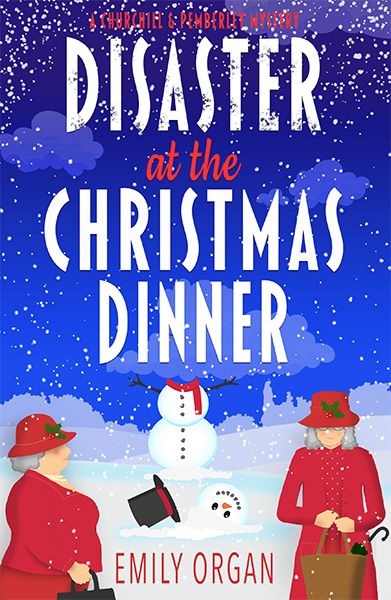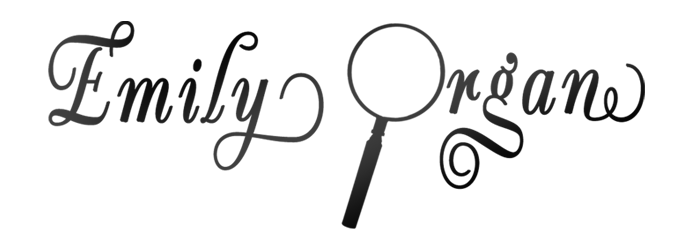
A poisoned plum pudding. A mutilated snowman. Christmas has gone disastrously wrong in Compton Poppleford.
Elderly sleuths Churchill and Pemberley are enjoying Christmas dinner with friends when a guest is fatally poisoned. Who’s responsible for the deadly dose? And why did they ruin the festive fun?
Churchill and Pemberley use their knowledge of the guests to investigate, but there’s another demand on their time. A Christmas killjoy is carrying out barbaric attacks on snowmen. Where will they strike next?
As secrets are uncovered and snowy footprints are followed, the detective duo find themselves in one dead end after another. And as the snowman smasher escalates, there’s a risk that Christmas will be ruined for the entire village…
Churchill and Pemberley face the ultimate test – could a trusted friend actually be a killer?
Book 1: Tragedy at Piddleton Hotel
Book 2: Murder in Cold Mud
Book 3: Puzzle in Poppleford Wood
Book 4: Trouble in the Churchyard
Book 5: Wheels of Peril
Book 6: The Poisoned Peer
Book 7: Fiasco at the Jam Factory
Book 8: Disaster at the Christmas Dinner
Read an excerpt from Disaster at the Christmas Dinner “What time did this happen?” asked Annabel Churchill, transfixed by the prostrate body in the snow. Mr Pouch scratched his beard. He was lean and stooped, with a grey beard and large blue eyes. “Sometime in the night.” “Can you be any more specific?” “We went to bed at ten o’clock and all was well. Then I looked out of the kitchen window at first light and saw him lying here.” “Awful,” commented Doris Pemberley. Churchill struggled to muster the courage required for her next question, as the brutality was difficult to bear. “Where’s his head?” “I found it in pieces over there.” Mr Pouch pointed at the tree in the centre of the garden. “I followed the footprints he left all the way over to the oak. I think he threw the head against the trunk.” Churchill winced. “How could anyone be so cruel?” whimpered Pemberley. “Let me show you what’s left of the head.” Mr Pouch led them over to the tree and stooped to pick something up off the ground. “He snapped the nose in half.” He held up a piece of carrot for them to inspect. “What about his eyes?” asked Churchill. “I used two small pieces of coal. Not very original, I know. They’ll be around here somewhere.” He looked about on the ground. “Oh, there’s one by your foot, Miss Pemberley.” Pemberley grimaced and shrank away from it. Large, fat snowflakes began to float down from the leaden sky. Churchill pulled her woolly hat over her ears and surveyed the scene. “We need to establish whether this barbaric act was aimed at the snowman or yourself, Mr Pouch,” she said. “Have you upset anyone recently?” His jaw dropped. “Upset anyone? I’ve never upset anyone in my entire life.” Although Churchill considered this unlikely, Mr Pouch did strike her as a fairly unassuming, inoffensive man. “Perhaps you upset someone without realising it. I don’t mean to suggest that you’ve actually done anything of an offensive nature, Mr Pouch, but people can be touchy about the smallest things.” “I don’t think I’ve ever said or done anything that could possibly upset someone, or even mildly irritate them.” Churchill nodded. “Very well. We can only assume, then, that the assailant’s anger was directed at the snowman. Was it a particularly good snowman?” “Oh, yes. I always pride myself on building a good snowman. He stood at about four feet tall, with coal for the eyes and a carrot for the nose, as you know. I spent quite a bit of time collecting tiny stones for his mouth to give him a nice, wide smile. Oh, and he had a lovely, colourful scarf, too. That appears to have disappeared. I can’t see it anywhere.” “Perhaps the attacker took it,” suggested Pemberley. “A macabre trophy of some sort to remind himself of the terrible act he’d committed,” added Churchill. “We may be dealing with someone with a twisted mind here. The scarf will provide a useful piece of evidence, though, if we’re able to find it in someone’s possession. Can you please describe it for me, Mr Pouch?” She took her notebook from her handbag to note the description down. “Brown, purple and green stripes. My three favourite colours.” “Very fine colours indeed.” “I think the culprit must have been walking down the lane there and spotted Mr Marzipan as he looked over the hedge,” said Mr Pouch. “Mr Marzipan?” “That’s what we called the snowman.” “I like marzipan.” Churchill felt her mouth water at the very thought of it. There was still some Christmas cake in a tin in her office and she couldn’t wait to get back to it. She turned to Mr Pouch, eager to wrap things up. “You say someone could have spotted him as they walked down the lane. Surely it would have been dark, would it not?” “I think he must have walked past during the day and decided to come back after dark to beat Mr Marzipan to pieces.” “How terribly brutish,” commented Churchill. “I’m feeling quite upset about it,” said Mr Pouch. “I know he was only a snowman, but…” His voice trailed off and he wiped his eyes with a gloved hand. Churchill tightened her scarf and stamped her feet a little, trying to restore a little warmth to her numb toes. “We do have some clues,” she said. “As you said yourself, the culprit has left a lot of footprints.” “Which your dog is currently trampling all over,” replied Mr Pouch. “Call him over, Miss Pemberley,” said Churchill. “He’s ruining our evidence.” “Oswald!” Pemberley called out. The scruffy little dog paid her no attention as he criss-crossed the garden, trying to catch snowflakes in his mouth. “Oswald!” she called again. “Never mind,” said Churchill. “Let’s get a good look at these footprints before the snow covers them again.” “It’s quite creepy, isn’t it?” commented Pemberley. “To think that they’re the footprints of someone who would willingly cause such destruction. Shall we measure them?” “Good idea. Measuring tape at the ready, please.” “Measuring tape?” “Don’t you have a measuring tape in your handbag?” “No, Mrs Churchill. Do you?” “No, Pembers. I assumed you did.” “And I assumed you—” “Yes, all right. I get the idea.” Churchill opened her handbag and looked for something that would enable her to measure the footprint. “All I’ve got in here is a crochet needle. I suppose we could see how many crocheting needles the footprint is in width and length.” She pulled it out of her bag, then bent down next to one of the footprints. “I would say that it’s one-and-a-half crochet needles long and about half a crochet needle wide.” “The sole print looks interesting,” said Pemberley. “It’s ridged with horizontal stripes.” “So it is. Did you bring the camera with you?” “No. Did you?” “No, so we can’t take a photograph of it. I’ll make a quick sketch instead. This evidence won’t be here for long. It’ll be covered up by the new snowfall, then melt.” Churchill looked over at the large hole Oswald was excitedly digging dug in the snow. “What’s your dog doing now, Miss Pemberley?” “He’s just excited because it’s snowy and it’s nearly Christmastime.” “Yoo-hoo!” came a friendly call from the cottage door. The two ladies turned to see a red-haired lady stepping out of the cottage in a thick overcoat and boots. “Mrs Thonnings?” queried Churchill. She felt her eyebrows lift beneath her hat. “What an earth are you doing here?” Mrs Thonnings and Mr Pouch exchanged a coy glance and Churchill immediately realised how foolish a question it had been. “Oh I see,” she replied. “The pair of you are… Yes, I see now.” She made some arbitrary notes in her notebook. “Very good. Did you happen to see or hear anything out here last night, Mrs Thonnings?” “I’m afraid not,” she responded. “I slept like a log.” “All we’ve got to go on, then, is that this crime was committed between the hours of ten o’clock last night and sunrise this morning. What time was that?” “Eight o’clock,” said Pemberley. Churchill wrote this down. “We have the scarf to look out for and we’ve measured the footprints.” A thought occurred to her, and she turned back to the red-haired haberdasher. “Perhaps the assailant’s ire was directed at you, Mrs Thonnings.” “Me? No, that’s impossible. Nobody knew I was here. Other than Mrs Higginbath, who’s feeding my cat this morning.” “Can you think of anyone who may be upset about the… the liaison between the pair of you?” “I suppose it could have been one of my jealous ex-lovers.” Churchill felt a little nauseous at the thought. “Anyone in particular?” “Not really. They can all get a bit funny when you move on to someone new, can’t they? That said, I don’t think anyone knows that Bernard and I are an item yet.” “I see.” “Seeing as you’re here, Mrs Churchill and Miss Pemberley, perhaps you’d like to come to my Christmas dinner party. I’ve got Mrs Dobinson coming in to do the cooking.” “That would be lovely, Mrs Thonnings. When is it?” “This evening.” “This evening? I’s it something you’ve arranged at the last minute?” “Oh, no. I began arranging it a long time ago. Back in October, in fact.” “Oh?” “But there’s space for two extras this evening.” “You haven’t been able to fit all the spaces?” “Oh, I did. They were all filled in October, but Mrs Harris and Mrs Rumbold have dropped out.” “I see. So you didn’t originally intend to invite us?” “Well, I was going to, but then, you see, it was kind of a… a reciprocal invitation for people who have invited me to their Christmas dinners over the past few years.” Mrs Thonnings gave an awkward grin. Churchill felt herself bristling, then decided not to be offended, given that it was Christmastime and she was looking forward to some festive fun. “Thank you for your kind invitation, Mrs Thonnings. We’d be delighted to attend, wouldn’t we, Miss Pemberley?” “I think so.” “Oh, wonderful.” Mrs Thonnings clapped her hands together with glee. “I’ll see you both at my house at six o’clock.”
